
In the realm of medical diagnostics, few screenings carry the significance of a colonoscopy. Recently, I had the chance to engage in a compelling conversation with Dr Salina Lee, an esteemed gastroenterologist at RUSH MD Anderson Cancer Center, to delve into the latest developments in this vital procedure for colorectal cancer screening. Dr Lee’s insights were both enlightening and reassuring, reflecting her dedication to making this process more accessible and less daunting for patients.
Colorectal cancer remains a formidable challenge, ranking as the third most prevalent cancer in the United States and the second leading cause of cancer-related deaths. The severity of these figures is exacerbated by the cancer’s tendency to develop unnoticed, often presenting no symptoms until reaching an advanced stage. As Dr Lee pointed out, “The earlier colorectal cancer is detected, the better the options for successful treatment.” This belief is central to her mission of enhancing the accessibility and effectiveness of screening processes.
One of the greatest obstacles to widespread adoption of colonoscopy screening is the notorious preparation involved. Traditionally, this has been a major deterrent for many, requiring patients to endure a day or more of consuming large volumes of unpleasant liquid and fasting. Dr Lee acknowledged, “People’s ideas about the prep are one of the biggest barriers.” However, she was optimistic about recent advancements that are making these discomforts a thing of the past.
Today, preparation for a colonoscopy is significantly more tolerable. “The prep is split into two doses now, with much smaller-volume and better-tasting options available,” Dr Lee explained. Patients now have the option of two six-ounce doses, and for those who find liquid forms unappealing, tablet alternatives exist. Additionally, patients can maintain a low-fibre diet until noon the day before the procedure and consume clear, non-red liquids, such as freezer pops and gelatin, until midnight. Such improvements in preparation methods are encouraging more individuals to undergo this essential examination.
Furthermore, advancements in the colonoscopy procedure itself have markedly improved the detection of precancerous adenomatous polyps, known as adenomas. Dr Lee highlighted some of these innovations, such as virtual chromoendoscopy, which allows for enhanced contrast of the endoscopic view at the click of a button. “If there’s an adenoma, it will be highlighted,” she described, underscoring the simplicity with which these potential problem areas can be identified.
Endoscope attachments have also been developed to enhance visibility within the colon’s complex terrain. These tools help straighten and flatten the tissue, ensuring comprehensive examination. Perhaps the most noteworthy advancement is the incorporation of artificial intelligence into the procedure. AI-assisted colonoscopy employs intelligent algorithms to detect and highlight areas of interest for further scrutiny. Rush University Medical Center, where Dr Lee practices, was the first in Illinois to adopt this technology as a standard practice, marking a significant leap forward in screening efficacy.
Despite these technological strides, the fundamental message remains unchanged: screening is indispensable. For individuals at average risk, screening is recommended to commence at the age of 45 and continue until the age of 75, with adjustments made for individual circumstances. Beyond the age of 85, routine screening is generally not advised. Those with heightened risk factors, particularly a family history of colorectal cancer, should consult healthcare providers to develop a personalised screening plan.
Dr Lee’s enthusiasm and expertise offer a hopeful perspective on the future of colorectal cancer screening. With advancements in preparation and detection, the barriers that once discouraged patients from undergoing this crucial procedure are gradually being dismantled. As Dr Lee succinctly put it, “Our goal is to catch these cancers early, or even prevent them altogether, by removing polyps before they become cancerous.”
Reflecting on this dialogue, the prevailing sentiment is one of progress and optimism. As technology continues to evolve at an impressive pace, the once-dreaded colonoscopy is transforming into a manageable and potentially life-saving assessment. The future of colorectal cancer screening shines brightly, and with dedicated professionals like Dr Lee leading the charge, patients can face their healthcare with renewed confidence and hope.


Be the first to comment